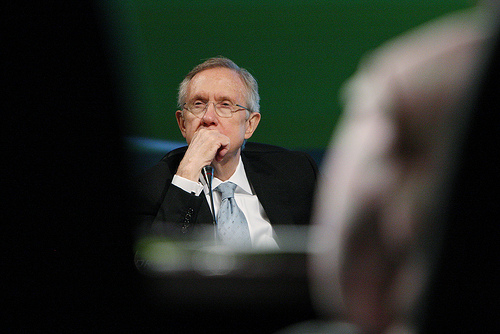Many have remarked already at this point that Tuesday’s State of the Union address did not include a single reference to “global warming,” “climate change,” or even something vague like “the environment.” There was, however, a lengthy discussion of energy, with President Obama calling for a new goal of drawing 80 percent of electricity from “clean” sources by 2035.
Obama has made clear statements on climate in his previous addresses; his first in 2009 talked about the need to “save our planet from the ravages of climate change,” and called for a “market-based cap on carbon pollution” to drive the production of renewable energy. And in 2010 he called on Congress to pass “a comprehensive energy and climate bill with incentives that will finally make clean energy the profitable kind of energy in America.” There was no such mention this year which, coupled with Monday’s announcement that climate czar Carol Browner is hitting the road, has likely upped the market for heartburn medicine among greenies.
With a cap and trade bill all but dead, it’s no mystery why he left it out this year. Instead, he devoted a page and a half of the 21-page printout of the speech handed to reporters Tuesday night to discussing energy. As one can expect, environmental groups weren’t all that excited about the inclusion of “clean coal” and nuclear in that mix, but that’s pretty broadly expected as the price one must pay to draw broader support for a clean energy standard. (See more on what they actually mean by the term “clean energy” here.)
On top of the 2035 goal, his plan calls for putting 1 million electric vehicles on the road by 2015, giving 80 percent of American access to high-speed rail, and ending a number of subsides and tax loopholes for oil (the part of his package that I believe might actually accomplish quite a bit on climate). The administration also said that it will call for expanding the Department of Energy’s Advanced Research Projects Agency-Energy in this year’s budget and doubling the number of innovation hubs to six. (More on the plan here.)
Other pundits have already wondered whether the issue of climate has simply become too divisive. The theory, then, is that clean energy should be an issue that crosses party lines and brings us all together for that Sputnik moment that Obama emphasized. Barbara Boxer (D-Calif.), the Senate’s champion on climate and energy issues, told me last night after the speech that she SAW this a deft move on the part of the president. “He’s trying to unify,” said Boxer. “There are a lot of people, when they hear ‘climate change,’ they say, ‘Oh, I don’t want to talk about it’ … I think it was very smart of him.”
And in a call with bloggers on Wednesday morning, Secretary of Energy Steven Ch, reiterated the belief that energy is a “nonpartisan issue,” as it means creating jobs and building wealth. “It doesn’t matter because this is wealth creation,” said Chu. “Rather than get in a debate about climate predictions, say this is a debate about our future prosperity.” (Chu also noted that “energy is more of a regional issue than a Republican-Democrat issue,” which I think is absolutely true.)
Here’s the problem: I really, really wish Chu, Boxer, and Obama were right. But I haven’t seen much to indicate that this is the case. In remarks at a House hearing on Wednesday, Alaska Rep. Don Young spun Obama’s remarks last night as evidence that he “doesn’t believe in fossil fuels,” as if they were akin to unicorns. There are plenty of people—and most of them happen to be Republicans—who don’t think that policies to support clean energy are worthwhile and who will oppose any attempt to move away from them. See the list of programs they’d like to cut if you don’t believe me.
My colleague David Roberts makes a compelling case for why this gambit just might work, but color me not yet convinced. Meanwhile, this latest iteration of the Obama climate and energy plan includes few of the driving forces that would actually make renewables cost-competitive in the near future and allow renewables to compete (the big one being, of course, a price on carbon pollution). Utilities aren’t making the switch out of the goodness of their largely-coal-powered hearts; they will do it because what has long been the cheap option will be significantly less so. And making that happen requires an acknowledgment that carbon pollution is bad and clean energy sources are good.












